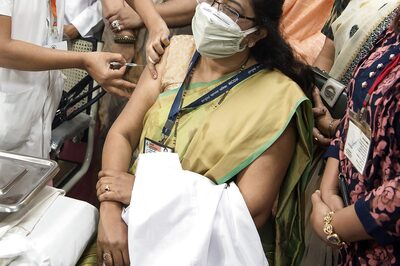
views
Mingora: Pakistani security forces attacked Taliban fighters on Wednesday killing at least 64 of them, the military said, after the United States called on the government to show its commitment to fighting militancy.
Expanding Taliban influence in nuclear-armed Pakistan has spread alarm at home and abroad and will be a core issue when US President Barack Obama meets his Afghan and Pakistani counterparts in Washington later on Wednesday.
A February peace pact aimed at ending Taliban violence in Swat has collapsed and thousands of people fled from Mingora, the region's main town, on Tuesday after a government official said fighting was expected.
The military launched attacks on the outskirts of Mingora, the main town in Swat, 130 km (80 miles) northwest of Islamabad, and in the nearby district of Buner.
While a curfew kept people off Mingora's streets, government forces struck militant targets with artillery and helicopters, including an emerald mine the Taliban had taken over.
"There have been two quick offensives by security forces. We knocked the militants out and are moving forward," said a security official who declined to be identified.
The army said 37 militants were killed in the clashes in Swat, 35 of them at the mine, while two soldiers were killed in a bomb blast. A militant headquarters near Mingora was also destroyed, the military said in a statement.
A paramilitary force said 27 militants were killed in Buner. There was no independent confirmation of the toll.
A military official, who declined to be identified, brushed off speculation the clashes signaled an imminent major offensive in Swat but residents said they saw troops being trucked in and a government official also said reinforcements were arriving.
Up to 38,000 people have been displaced from Swat and nearby areas since fighting flared last month, provincial authorities said, adding that up to 800,000 people could flee from the valley, which has a population of 1.6 to 1.7 million.
Several hundred thousand have already fled fighting in different parts of the northwest since August, putting an extra burden on an economy propped up by a $7.6 billion International Monetary Fund loan.
Pakistani stocks have been hurt by security worries in recent months but the main index ended 1.65 percent higher on Wednesday.
A Taliban spokesman said the Swat peace pact was over. "The situation is very bad. They're using all sort of force against us. Full-fledged war has begun and our fighters are putting up resistance," the spokesman, Muslim Khan, said by telephone.
UNWAVERING COMMITMENT
President Asif Ali Zardari, former prime minister Benazir Bhutto's widower, is due to meet Obama and Afghanistan President Hamid Karzai for talks on the militant threat.
Obama will urge the leaders to put aside a history of mistrust and join Washington in an alliance against extremists, US administration officials said.
Pakistani action against militant enclaves on the Afghan border is vital to efforts to stabilise Afghanistan. But increasing violence and the spread of the Taliban in Pakistan have raised doubts about the ability of the civilian government elected last year to deal with the threat.
"Pakistan must demonstrate its commitment to rooting out al-Qaeda and the violent extremists within its borders," US special representative for Afghanistan and Pakistan, Richard Holbrooke, said in congressional testimony on Tuesday.
Foreign Office spokesman Abdul Basit said Pakistan's commitment was unwavering: "We are suffering the most because of terrorism. Who else would be more interested in extirpating this?"
Afghanistan President Karzai said on Tuesday that Pakistan -- whose intelligence services have long been accused of maintaining old ties to the Afghan Taliban for strategic reasons -- should sever such links. Basit said the neighbours needed to transcend such old suspicions.
A Pakistani security analyst said the talks in Washington should at least improve understanding. What Pakistan gets out of it will depend on how forcefully it puts its case.
"We're being blamed for the cross-border movement (of militants to Afghanistan) but when we say 'increase the number of military posts on your side or fence the border or do selective mining', they don't agree," said the analyst, Nasim Zehra.
Critics say Pakistan has been in denial about the Taliban threat in a country where old rival India has long been the enemy and where militants have been used as "strategic assets" since the battle against Soviet occupiers in Afghanistan in the 1980s.




















Comments
0 comment